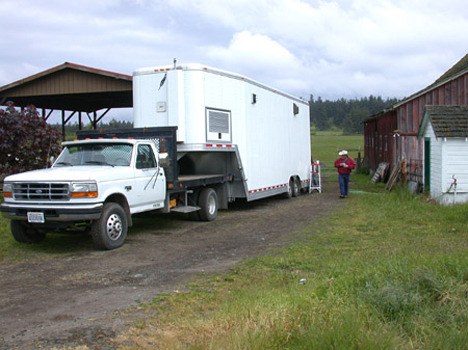The idea of a place to process Lopez Island food has been in the air for some time. Now, a group of locals, including Randal Waugh, is trying to get people interested in making the conceptual a reality.
“I first moved here in ’87, even then people were talking about a place for food,” Waugh says.
It was these conversations that finally resulted in the purchase of the USDA-approved mobile meat processing unit. Introduced in the early ’90s, the unit was a groundbreaking step for agriculture on a local scale, being the first of its kind in the nation.
Waugh says the success of the mobile meat processing unit is proof that local processing is not only possible, but profitable. A community commercial kitchen would expand upon this success.
Under the name of L.I.C.K (Lopez Island Community Kitchen), Waugh envisions a permanent space with multiple rooms and therefore multiple products. His research has shown that by meeting USDA criteria, one kitchen can be used to process a multiplicity of goods, not only meat.
“I have made some phone calls, and one of the people I have spoken with was the president of WAFDO (Western Association of Food and Drug Officials), Gena Reich. She was very helpful. She said you don’t have to dream anything up because they have a punch list. They can walk you through the list of what you want — dairy, meat, pickling, baked goods … anything.”
The benefits of such an enterprise are, in Waugh’s opinion, more sophisticated than simply allowing Lopez food to stay on Lopez, although feeding people is a priority for Waugh. Waugh says the installation of a commercial kitchen would contribute to Lopez’s sense of self, the education system, and employment.
Waugh has had direct experience of what this level of production does to community identity.
After years of working construction — “building houses for someone else” — Waugh hit upon the idea of making his own hot sauce. Over time he pieced together a unique recipe, the result being his Chicaoji hot sauce business.
Waugh says he could not have achieved this were it not for Jean Perry at Vortex lending him the use of her commercial kitchen. It was access to this professional resource that opened new doors for Waugh and made him realize his personal potential.
Holli Wallace, assistant at Vortex, says she really enjoyed watching Waugh devise his own recipe, and the satisfaction he got from it.
Waugh says he would like to see other Lopezians given the opportunity to take their food production farther. With the stamp of USDA approval, Lopez products could be more easily distributed off-island. A commercial kitchen would, Waugh says, open up the outside economy to islanders.
“You just can’t make something in your kitchen and sell it. There’s a check list.”
This economic incentive is not Waugh’s final word on the subject. He sees the kitchen as an important resource for Lopez youth.
“We’re teaching these kids how to grow food, so they’re coming out of the educational process knowing how to make food, but what are they going to do with it?” Waugh says they should “take their stuff down to the food processing unit and make a living.”
Perhaps one of the biggest issues Waugh foresees is the location of the kitchen. When the old Lopez Village Market was vacated, a commercial kitchen was among the suggestions for filling the space. Aaron Dye, market manager, says he is not yet in a position to pursue any one idea for the old market building, but is willing to listen.
“Our biggest thing is there is a lot of clean up that has got to be done [to the old market]. It’s an old building.” He remains positive about many of the community suggestions, the kitchen included, but “can’t make any promises.”
At this point in time, Waugh is chiefly interested in establishing Lopez support for the project. There is not yet a committee of people actively pursing the idea, and Waugh is simply “putting it out there” to the community.
“We’re all busy, everyone is struggling to make a living, but we’re at a point right now where it feels like the time has come to do this.”
To comment to Waugh or for more information about the commercial kitchen project, write to chicaoji@gmail.com.



